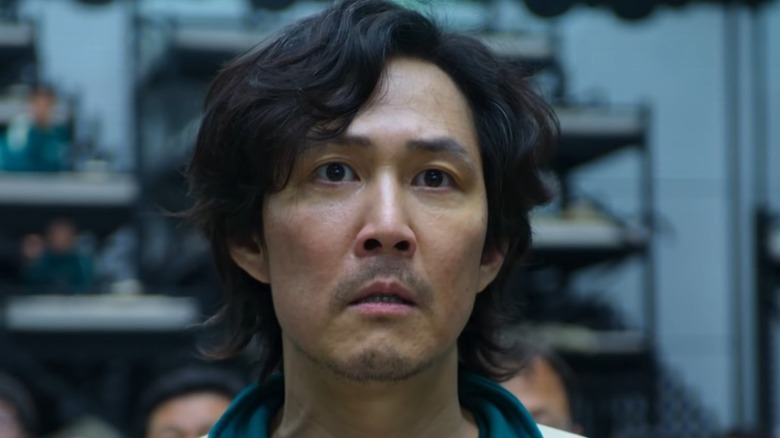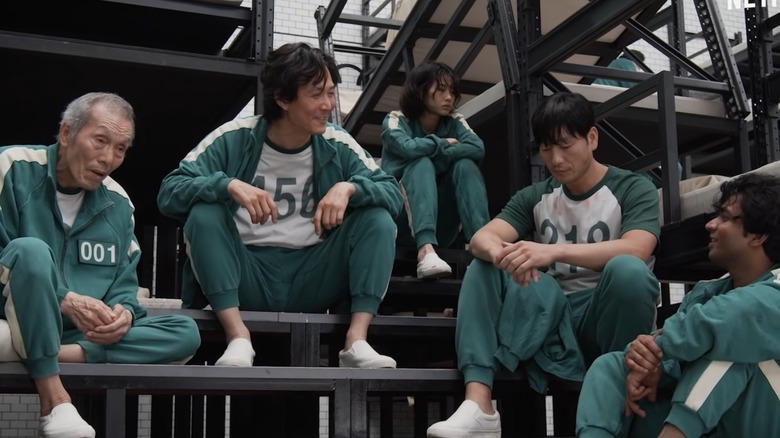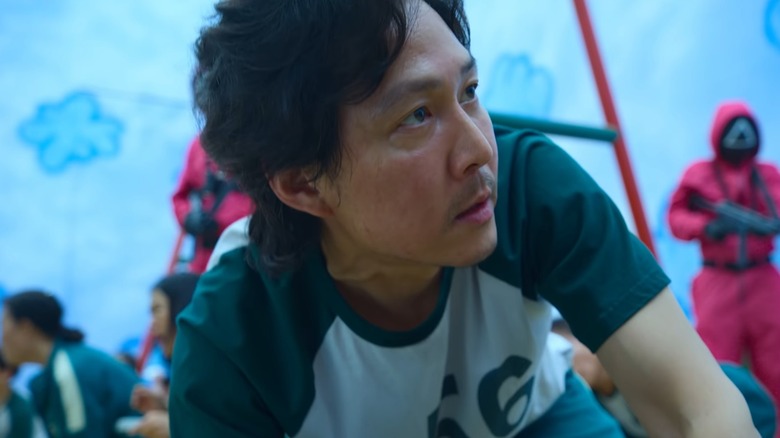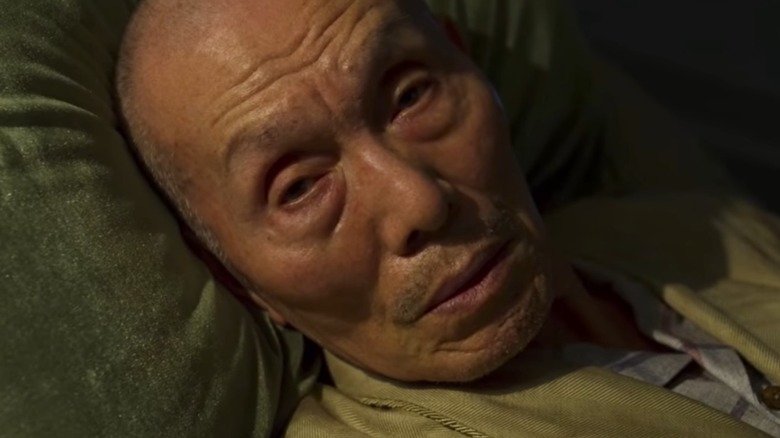The Final Game Theory That Changes Everything On Squid Game
Hwang Dong-hyuk's "Squid Game" is a lot of things. It's a hyper-violent survival drama. It's a commentary on class and capitalism. It's a peek inside of South Korean culture. Variety called it an international hit, with the potential to change the streaming landscape forever. It's one of the most popular Netflix shows of all time.
But beneath its cultural relevance, global impact, and heavy themes, it's a story about a group of people struggling against the system — and each other — for a chance at a better life. That's a lot to take in. So if you're one of the dozen or so humans who haven't seen "Squid Game" quite yet, here's the gist.
A total of 456 debt-laden South Koreans are whisked away to a mysterious island where they compete in children's games like tug-of-war, marbles, and red light/green light. Those who win six consecutive games are given 45.6 billion won (or, per Forbes, about $38.5 million USD). Those who don't win, however, are eliminated, which is essentially a code word for brutally slaughtered. And just so we're very clear, of the 456 competitors, 455 of them don't win. However, there's a "Squid Game" theory floating around on Reddit that could change things for the contest's eventual winner.
Squid Game's most important alliance
Before we get to the actual theory, we should go back to the earlier stages of the games, where "Squid Game" protagonist Seong Gi-hun (Lee Jung-jae) finds safety in numbers. He allies with a number of competitors, including an enfeebled old man named Oh Il-nam (Oh Yeong-su). And this turns out to be the most brilliant decision Gi-hun could've made, because unbeknownst to him (and major spoilers for the show), Il-nam is the Machiavellian architect of the entire contest.
During the games, Gi-hun is among those who survive red light/green light. He then succeeds in liberating an umbrella etching from a sugar honeycomb (if you haven't seen the show, don't ask). Thanks in large part to Il-nam's strategy, Gi-hun's team narrowly makes it through the tug-of-war. He then manipulates his way to victory in a game of marbles, ostensibly leading to Il-nam's elimination. Next, Gi-hun traverses a stepping stone-inspired bridge made of brittle glass (which, by the way, legitimately terrified the actors). And finally, he outduels his friend-turned-foe Sang-woo (Park Hae-soo) in the eponymous Squid Game.
By the show's conclusion, he's the only contestant to win all six games — and the 45.6-billion-won payout. But there weren't six games, according to the fan theory. There were seven. And Gi-hun unknowingly lost the last one.
Squid Game's seventh -- and final -- game
After winning the prize money, an exhausted and traumatized Gi-hun returns home to discover his life has even less purpose than it did when he entered the contest. And after a year, we learn that Gi-hun hasn't spent a cent of his winnings. That's when he gets a letter from Il-nam (who was thought to be dead), inviting him to a quiet room in a near-empty high-rise. When Gi-hun arrives, he finds Il-nam on his deathbed, hooked up to an EKG, staring solemnly out at the city through a nearby window.
From that deathbed, Il-nam explains everything — he identifies himself as a member of the uber-rich elite and reveals he designed the games to entertain him and his unimaginably wealthy friends. However, after being diagnosed with a terminal brain tumor, he thought it'd be fun to participate in some of his favorite childhood games again instead of watching from afar.
And, as a dying wish, Il-nam asks Gi-hun to play one final game with him — a test of humanity's inherent kindness (or lack thereof). From the high-rise window, they spot a drunk homeless man sitting helplessly on the sidewalk in the chilly night air. The homeless man will certainly freeze to death if nobody helps him. Il-nam wagers that no one will help the man before the stroke of midnight.
Gi-hun, a believer in human goodness, wagers the opposite — someone will help the man before midnight. And together, Il-nam and Gi-hun stare out into the night, participating in the old man's seventh and final game. But what was the game's actual purpose?
Was Il-nam looking for an heir?
In an October 24 Reddit post, user ArenLuxon analyzed this scene and identifies a major character inconsistency. "Gi-Hun could have won instantly," they wrote. "All he had to do was go down there and help the homeless man himself. It is completely within the boundaries of the game and it would fit his ideology extremely well. Gi-Hun believes in helping other people, not sitting around waiting for others to help. At least, in theory, because he was so wrapped up in the game that it never occured (sic) to him to help out. He was watching someone die just to prove he's right about humanity."
So, Gi-hun never rescues the homeless drunk because he wants to see how the seventh and final game plays out. That bodes well for Il-Nam because according to ArenLuxon, he was testing Gi-hun for a very specific reason. "I think that Il-Nam was looking for an heir," the Redditor continued. "So he created the homeless man game to prove to Gi-Hun that he is no different from him and he will watch a homeless man die for the sake of a game. And that way, he would try to convince Gi-Hun to become his heir and help organise the games."
However, just before midnight, a police car arrives and the cops offer to help the homeless man. This reinforces Gi-hun's worldview about innate human goodness, snaps him out of the gaming mindset, and (if this theory has any credence) ruins Il-nam's plan. According to ArenLuxon, when Gi-hun's feelings about the world are validated, Il-nam covertly pulls the plug on the experiment — and literally pulls the plug on his EKG, though this isn't seen by viewers. The Redditor believes the old man was simulating a cardiac flatline, effectively forcing Gi-hun to vacate the premises.
Is the theory likely? Maybe it is, maybe it isn't. But in a show with as many layers and themes as "Squid Game," who are we to rule out something like overcomplicated succession planning?



